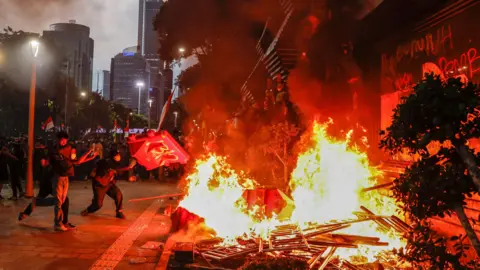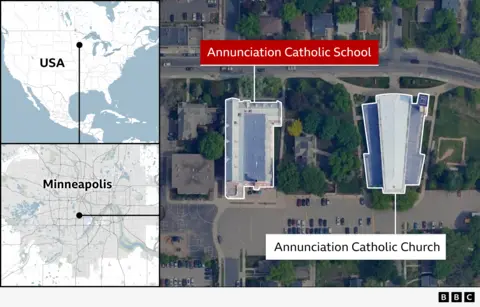The Vatican City witnessed a historic moment as Cardinal Robert Francis Prevost was elected the 267th pope, taking the name Pope Leo XIV. Hailing from Chicago but having served two decades in Peru, he is the first pontiff from the United States, which has generated enthusiasm and surprise domestically and internationally.
The announcement of Leo XIV’s election was met with jubilation in St. Peter’s Square, where crowds waved flags and chanted in excitement. His inaugural address echoed the need for peace and a united church, aligning with the ideals of his predecessor, Pope Francis. In a deliberate choice, he opted to speak in Italian and Spanish during his address, disregarding English despite his American origins, drawing connections to his pastoral work in Peru.
Prevost's election follows the death of Pope Francis just a month prior, and occurred during a conclave of 133 cardinals, who struggled to agree on a new leader amidst differing ideologies within the church. The decision was made after over twenty-four hours of deliberation, concluding with white smoke billowing from the Sistine Chapel, signaling that a new pope had been chosen.
International reactions have poured in, with leaders from around the world congratulating Pope Leo XIV and extending wishes for peace and cooperation. President Trump hailed his election as a "great honor" for the United States, while other global leaders expressed hopes that the new pope will strengthen interfaith dialogue.
Supporters from various political backgrounds interpret his choice of name as indicative of his commitment to the church's social teachings, balanced between progressive and conservative values. While some American Catholics are optimistic about the potential influence of an American pope, there remains a cautious apprehension regarding how Leo XIV will navigate the complexities of contemporary church issues, particularly in relation to inclusivity and social justice.
Leo XIV’s background as a polyglot and a member of the Augustinian order positions him as a leader with a commitment to serving marginalized communities, though aspects of his previous statements on LGBTQ+ issues could lead to debates about his papacy's direction.
The election resonates deeply within his hometown of Chicago, creating a sense of pride among locals. As people eagerly await his leadership, the first American pope now stands as a symbol of possibility and continuity in today's global Catholic landscape, with many hoping he will continue the outreach and social focus established by Pope Francis.
The announcement of Leo XIV’s election was met with jubilation in St. Peter’s Square, where crowds waved flags and chanted in excitement. His inaugural address echoed the need for peace and a united church, aligning with the ideals of his predecessor, Pope Francis. In a deliberate choice, he opted to speak in Italian and Spanish during his address, disregarding English despite his American origins, drawing connections to his pastoral work in Peru.
Prevost's election follows the death of Pope Francis just a month prior, and occurred during a conclave of 133 cardinals, who struggled to agree on a new leader amidst differing ideologies within the church. The decision was made after over twenty-four hours of deliberation, concluding with white smoke billowing from the Sistine Chapel, signaling that a new pope had been chosen.
International reactions have poured in, with leaders from around the world congratulating Pope Leo XIV and extending wishes for peace and cooperation. President Trump hailed his election as a "great honor" for the United States, while other global leaders expressed hopes that the new pope will strengthen interfaith dialogue.
Supporters from various political backgrounds interpret his choice of name as indicative of his commitment to the church's social teachings, balanced between progressive and conservative values. While some American Catholics are optimistic about the potential influence of an American pope, there remains a cautious apprehension regarding how Leo XIV will navigate the complexities of contemporary church issues, particularly in relation to inclusivity and social justice.
Leo XIV’s background as a polyglot and a member of the Augustinian order positions him as a leader with a commitment to serving marginalized communities, though aspects of his previous statements on LGBTQ+ issues could lead to debates about his papacy's direction.
The election resonates deeply within his hometown of Chicago, creating a sense of pride among locals. As people eagerly await his leadership, the first American pope now stands as a symbol of possibility and continuity in today's global Catholic landscape, with many hoping he will continue the outreach and social focus established by Pope Francis.



















